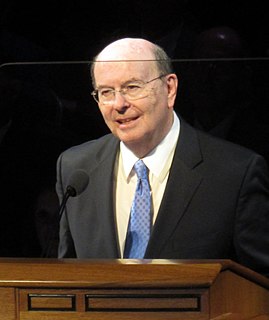A Quote by Marianne Williamson
We receive His peace when we ask Him for it. We keep His peace by extending it to others. Those are the keys and there are no others.
Related Quotes
The followers of Christ have been called to peace. . . . And they must not only have peace but make it. And to that end they renounce all violence and tumult. In the cause of Christ nothing is to be gained by such methods . . . . His disciples keep the peace by choosing to endure suffering themselves rather than inflict it on others. They maintain fellowship where others would break it off. They renounce hatred and wrong. In so doing they overcome evil with good, and establish the peace of God in the midst of a world of war and hate.
Peace starts within each one of us. When we have inner peace, we can be at peace with those around us. When our community is in a state of peace, it can share peace with neighboring communities, and so on. When we feel love and kindness towards others, it not only makes others feel loved and cared for, but it helps us also to develop inner happiness and peace.
Francis of Assisi tells us we should work to build peace. But there is no true peace without truth! There cannot be true peace if everyone is his own criterion, if everyone can always claim exclusively his own rights, without at the same time caring for the good of others, of everyone, on the basis of the nature that unites every human being on this earth.
Someone once inquired of a Far Eastern Zen master, who had a great serenity and peace about him no matter what pressures he faced, "How do you maintain that serenity and peace?" He replied, "I never leave my place of meditation." He meditated early in the morning and for the rest of the day, he carried the peace of those moments with him in his mind and heart.
To some men peace merely means the liberty to exploit other people without fear of retaliation or interference. To others peace means the freedom to rob others without interruption. To still others it means the leisure to devour the goods of the earth without being compelled to interrupt their pleasures to feed those whom their greed is starving. And to practically everybody peace simply means the absence of any physical violence that might cast a shadow over lives devoted to the satisfaction of their animal appetites for comfort and pleasure.
An impractical man--which he not only seems to be, but really is--will always be unreliable and unpredictable in his dealings with others. He will engage in actions that mean something else to him than to others, but he is at peace with himself about everything as long as he can make it all come together in a fine idea.
From our sorrow we might seek out the sweetness and the good that is often associated with and peculiar to our challenge. We can seek out those memorable moments that are frequently hidden by the pain and agony. We can find peace in extending ourselves to others, using our own experiences to provide hope and comfort. And we can always remember with great solemnity and gratitude Him who suffered most to make it all right for us. And by so doing we can be strengthened to bear our burdens in peace. And then, the 'works of God' might be manifest.
Without inner peace, outer peace is impossible. We all wish for world peace, but world peace will never be acheived unless we first establish peace within our own minds. We can send so-called 'peacekeeping forces' into areas of conflict, but peace cannot be oppossed from the outside with guns. Only by creating peace within our own mind and helping others to do the same can we hope to achieve peace in this world.
Ed Koch will never "rest in peace." That was not his way. He was always nervously squirming, while making others squirm as well. Comfort was not his goal. He understood that to be a proud and assertive Jew meant never being able to leave a sigh of relief and say "it's over, we are at peace, we can now put down our guard and relax."
Ed Koch will never 'rest in peace.' That was not his way. He was always nervously squirming, while making others squirm as well. Comfort was not his goal. He understood that to be a proud and assertive Jew meant never being able to leave a sigh of relief and say, 'It's over, we are at peace, we can now put down our guard and relax.'

































